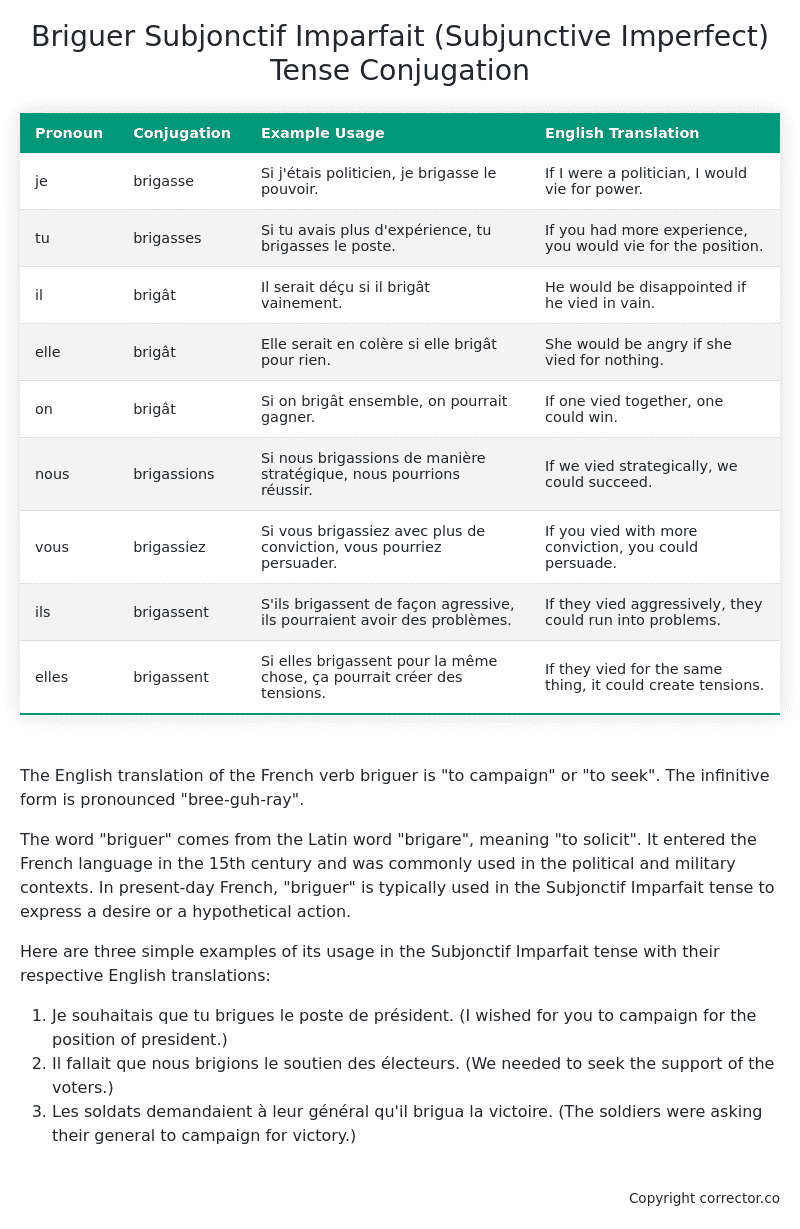Subjonctif Imparfait (Subjunctive Imperfect) Tense Conjugation of the French Verb briguer
Introduction to the verb briguer
The English translation of the French verb briguer is “to campaign” or “to seek”. The infinitive form is pronounced “bree-guh-ray”.
The word “briguer” comes from the Latin word “brigare”, meaning “to solicit”. It entered the French language in the 15th century and was commonly used in the political and military contexts. In present-day French, “briguer” is typically used in the Subjonctif Imparfait tense to express a desire or a hypothetical action.
Here are three simple examples of its usage in the Subjonctif Imparfait tense with their respective English translations:
- Je souhaitais que tu brigues le poste de président. (I wished for you to campaign for the position of president.)
- Il fallait que nous brigions le soutien des électeurs. (We needed to seek the support of the voters.)
- Les soldats demandaient à leur général qu’il brigua la victoire. (The soldiers were asking their general to campaign for victory.)
Table of the Subjonctif Imparfait (Subjunctive Imperfect) Tense Conjugation of briguer
| Pronoun | Conjugation | Example Usage | English Translation |
|---|---|---|---|
| je | brigasse | Si j’étais politicien, je brigasse le pouvoir. | If I were a politician, I would vie for power. |
| tu | brigasses | Si tu avais plus d’expérience, tu brigasses le poste. | If you had more experience, you would vie for the position. |
| il | brigât | Il serait déçu si il brigât vainement. | He would be disappointed if he vied in vain. |
| elle | brigât | Elle serait en colère si elle brigât pour rien. | She would be angry if she vied for nothing. |
| on | brigât | Si on brigât ensemble, on pourrait gagner. | If one vied together, one could win. |
| nous | brigassions | Si nous brigassions de manière stratégique, nous pourrions réussir. | If we vied strategically, we could succeed. |
| vous | brigassiez | Si vous brigassiez avec plus de conviction, vous pourriez persuader. | If you vied with more conviction, you could persuade. |
| ils | brigassent | S’ils brigassent de façon agressive, ils pourraient avoir des problèmes. | If they vied aggressively, they could run into problems. |
| elles | brigassent | Si elles brigassent pour la même chose, ça pourrait créer des tensions. | If they vied for the same thing, it could create tensions. |
Other Conjugations for Briguer.
Le Present (Present Tense) Conjugation of the French Verb briguer
Imparfait (Imperfect) Tense Conjugation of the French Verb briguer
Passé Simple (Simple Past) Tense Conjugation of the French Verb briguer
Passé Composé (Present Perfect) Tense Conjugation of the French Verb briguer
Futur Simple (Simple Future) Tense Conjugation of the French Verb briguer
Futur Proche (Near Future) Tense Conjugation of the French Verb briguer
Plus-que-parfait (Pluperfect) Tense Conjugation of the French Verb briguer
Passé Antérieur (Past Anterior) Tense Conjugation of the French Verb briguer
Futur Antérieur (Future Anterior) Tense Conjugation of the French Verb briguer
Subjonctif Présent (Subjunctive Present) Tense Conjugation of the French Verb briguer
Subjonctif Passé (Subjunctive Past) Tense Conjugation of the French Verb briguer
Subjonctif Imparfait (Subjunctive Imperfect) Tense Conjugation of the French Verb briguer (this article)
Subjonctif Plus-que-parfait (Subjunctive Pluperfect) Tense Conjugation of the French Verb briguer
Conditionnel Présent (Conditional Present) Tense Conjugation of the French Verb briguer
Conditionnel Passé (Conditional Past) Tense Conjugation of the French Verb briguer
L’impératif Présent (Imperative Present) Tense Conjugation of the French Verb briguer
L’infinitif Présent (Infinitive Present) Tense Conjugation of the French Verb briguer
Struggling with French verbs or the language in general? Why not use our free French Grammar Checker – no registration required!
Get a FREE Download Study Sheet of this Conjugation 🔥
Simply right click the image below, click “save image” and get your free reference for the briguer Subjonctif Imparfait tense conjugation!

Briguer – About the French Subjonctif Imparfait (Subjunctive Imperfect) Tense
Formation
Common Everyday Usage Patterns
Interactions with Other Tenses
Subjonctif Présent
Indicatif Passé Composé
Conditional
Conditional Perfect
Summary
I hope you enjoyed this article on the verb briguer. Still in a learning mood? Check out another TOTALLY random French verb conjugation!


